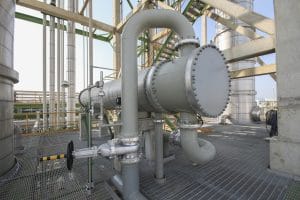 Effective thermal management for industries like manufacturing and power plants has always been a challenge. To meet it, companies used to have to rely on costly, sometimes unreliable solutions like air conditioners. Fortunately, today’s electrical waste heat management can often be much simpler and cost-effective, especially with the help of advanced heat exchangers. Rather than grudgingly accepting the high costs of traditional thermal management techniques, companies can improve a number of areas of operations by upgrading their cooling solutions to advanced heat exchangers. (more…)
Effective thermal management for industries like manufacturing and power plants has always been a challenge. To meet it, companies used to have to rely on costly, sometimes unreliable solutions like air conditioners. Fortunately, today’s electrical waste heat management can often be much simpler and cost-effective, especially with the help of advanced heat exchangers. Rather than grudgingly accepting the high costs of traditional thermal management techniques, companies can improve a number of areas of operations by upgrading their cooling solutions to advanced heat exchangers. (more…)
How These Technologies Benefit from Heat Exchangers
 Ever since they were first introduced to the mainstream as efficient alternatives to air conditioners, heat exchangers have continued to transform the realm of electrical thermal management. For example, manufacturing facilities can now operate continuously without worrying about equipment overheating or energy costs skyrocketing. In fact, heat exchangers have been so successful that virtually every industry now has multiple uses for them, and in many cases, they’ve helped make possible the evolution of advanced technologies. (more…)
Ever since they were first introduced to the mainstream as efficient alternatives to air conditioners, heat exchangers have continued to transform the realm of electrical thermal management. For example, manufacturing facilities can now operate continuously without worrying about equipment overheating or energy costs skyrocketing. In fact, heat exchangers have been so successful that virtually every industry now has multiple uses for them, and in many cases, they’ve helped make possible the evolution of advanced technologies. (more…)
Can Heat Exchangers Improve an Existing Application?
 Thermal management is a vital component to any electrical equipment or technology. As such, most application’s function optimally when an appropriate thermal management solution is considered during the design process. Yet, existing machinery, control panels, and other forms of technology can also benefit greatly from cleaner, more efficient, and more reliable ways of managing electrical waste heat, especially those that have previously relied on solutions such as air conditioning. To help companies save on thermal management costs without having to unnecessarily replace equipment, heat exchangers can often be fitted to existing applications in a variety of industries. (more…)
Thermal management is a vital component to any electrical equipment or technology. As such, most application’s function optimally when an appropriate thermal management solution is considered during the design process. Yet, existing machinery, control panels, and other forms of technology can also benefit greatly from cleaner, more efficient, and more reliable ways of managing electrical waste heat, especially those that have previously relied on solutions such as air conditioning. To help companies save on thermal management costs without having to unnecessarily replace equipment, heat exchangers can often be fitted to existing applications in a variety of industries. (more…)
How Heat Exchangers Transfer Heat
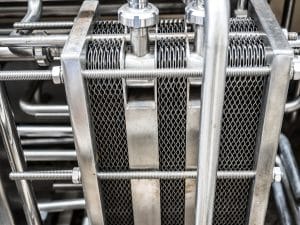 The secret behind how heat exchangers revolutionized electrical thermal management lies in their efficient, eco-friendly methods of transferring waste heat. For instance, instead of actively chilling the air inside of an electrical enclosure, a heat exchanger’s fluid can absorb the heat and transfer it safely away from components that could be damaged by it. Depending on the specific application, heat exchanger technology can be applied in several ways, such as heat spreading, conduction, natural/forced convection, or a combination of these and other techniques. (more…)
The secret behind how heat exchangers revolutionized electrical thermal management lies in their efficient, eco-friendly methods of transferring waste heat. For instance, instead of actively chilling the air inside of an electrical enclosure, a heat exchanger’s fluid can absorb the heat and transfer it safely away from components that could be damaged by it. Depending on the specific application, heat exchanger technology can be applied in several ways, such as heat spreading, conduction, natural/forced convection, or a combination of these and other techniques. (more…)
The Modern Science of Thermal Management Design
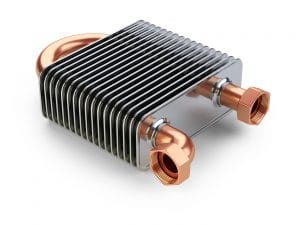 The science of electrical thermal management grows more complex every time new technology is developed or old technology is improved upon. Typically, new technologies are more powerful than their predecessors, and therefore, need higher performing heat transfer methods. However, new applications are also generally smaller than those before them, which means their thermal management solutions also have to fit into tighter spaces. To effectively and efficiently meet the changing demands of innovative technology, heat exchangers are often the ideal thermal management solution. Designing more powerful thermal management solutions is easier and less time-consuming when the designs are based on proven, highly customizable technology, such as heat exchangers. (more…)
The science of electrical thermal management grows more complex every time new technology is developed or old technology is improved upon. Typically, new technologies are more powerful than their predecessors, and therefore, need higher performing heat transfer methods. However, new applications are also generally smaller than those before them, which means their thermal management solutions also have to fit into tighter spaces. To effectively and efficiently meet the changing demands of innovative technology, heat exchangers are often the ideal thermal management solution. Designing more powerful thermal management solutions is easier and less time-consuming when the designs are based on proven, highly customizable technology, such as heat exchangers. (more…)
Why Companies Rely on Heat Exchangers
 The heat exchanger market has become a worldwide industry as more and more companies rely on them for a variety of thermal management needs. In addition to cooling electrical control cabinets, which made heat exchangers famous, the technology is now used for broad range of applications throughout virtually every industry. The reason companies continue to rely on heat exchangers is because they continue to help reduce overall costs and improve productivity as they advanced along with more powerful technology. That means even as manufacturing equipment and other technologies grow more powerful, heat exchangers continue to be able to effectively and efficiently meet their high-performance thermal management demands. (more…)
The heat exchanger market has become a worldwide industry as more and more companies rely on them for a variety of thermal management needs. In addition to cooling electrical control cabinets, which made heat exchangers famous, the technology is now used for broad range of applications throughout virtually every industry. The reason companies continue to rely on heat exchangers is because they continue to help reduce overall costs and improve productivity as they advanced along with more powerful technology. That means even as manufacturing equipment and other technologies grow more powerful, heat exchangers continue to be able to effectively and efficiently meet their high-performance thermal management demands. (more…)
The Role of Heat Exchangers in Oil & Gas Processing
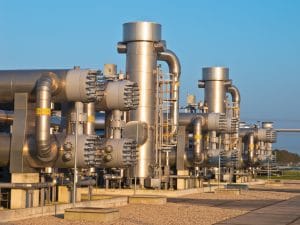 Thermal management has always been important, and in many instances, complex. Yet, in hazardous fields like oil and gas processing, there are more considerations than usual when it comes to implementing electrical and other thermal management solutions. For example, consistent and reliable thermal management is especially important to minimize the need for employees to venture out to fix or maintain equipment. The ability to cool equipment without drawing on enormous amounts of energy is essential for companies to control overhead costs. These and other special considerations make thermal management in oil and gas processing particularly challenging, and heat exchangers are often up for the challenge. (more…)
Thermal management has always been important, and in many instances, complex. Yet, in hazardous fields like oil and gas processing, there are more considerations than usual when it comes to implementing electrical and other thermal management solutions. For example, consistent and reliable thermal management is especially important to minimize the need for employees to venture out to fix or maintain equipment. The ability to cool equipment without drawing on enormous amounts of energy is essential for companies to control overhead costs. These and other special considerations make thermal management in oil and gas processing particularly challenging, and heat exchangers are often up for the challenge. (more…)
The Most Important Benefits of Heat Exchangers
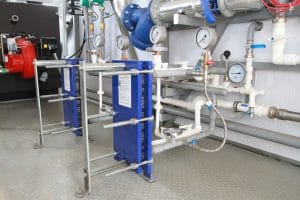 Heat exchangers have been an important part of electrical thermal management for several decades, and they continue to grow even more popular as more industries take advantage of their benefits. Most importantly, those benefits include the ability to effectively and efficiently transfer electrical waste heat without the exorbitant energy and maintenance needs that are typically associated with other forms of thermal management. When implemented in most manufacturing and other industry processes, these benefits can have a widespread impact on a company’s overall operations. (more…)
Heat exchangers have been an important part of electrical thermal management for several decades, and they continue to grow even more popular as more industries take advantage of their benefits. Most importantly, those benefits include the ability to effectively and efficiently transfer electrical waste heat without the exorbitant energy and maintenance needs that are typically associated with other forms of thermal management. When implemented in most manufacturing and other industry processes, these benefits can have a widespread impact on a company’s overall operations. (more…)
Testing the Feasibility of Heat Exchangers for Optimal Solutions
 The ability to keep up with continuously advancing technology is one of modern heat exchangers’ greatest strengths. By taking advantage of a variety of efficient and eco-friendly heat transfer methods, heat exchangers can be customized or custom-designed to fit new applications with increasing power outputs and thermal management demands. To ensure that each thermal management solution is the optimal one, feasibility studies are typically performed to analyze and test new ideas according to the application’s requirements. This is especially useful when innovating new concepts and designs to meet the demands of more powerful and advanced technology. (more…)
The ability to keep up with continuously advancing technology is one of modern heat exchangers’ greatest strengths. By taking advantage of a variety of efficient and eco-friendly heat transfer methods, heat exchangers can be customized or custom-designed to fit new applications with increasing power outputs and thermal management demands. To ensure that each thermal management solution is the optimal one, feasibility studies are typically performed to analyze and test new ideas according to the application’s requirements. This is especially useful when innovating new concepts and designs to meet the demands of more powerful and advanced technology. (more…)
Sustainable Wastewater Treatment with Heat Exchangers
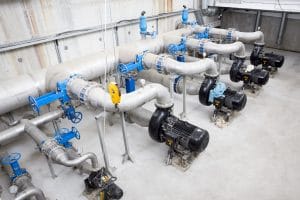 Like thermal management, wastewater treatment is a vital part of many industries. Some facilities do nothing else but treat wastewater, such as municipal treatment plants. However, even unrelated industries rely on the process of removing toxins and harmful chemicals from the water produced as a result of their processes. In most cases, successful wastewater treatment is a continuous process, and making it a sustainable one means implementing more reliable and efficient thermal management solutions, such as advanced heat exchangers. (more…)
Like thermal management, wastewater treatment is a vital part of many industries. Some facilities do nothing else but treat wastewater, such as municipal treatment plants. However, even unrelated industries rely on the process of removing toxins and harmful chemicals from the water produced as a result of their processes. In most cases, successful wastewater treatment is a continuous process, and making it a sustainable one means implementing more reliable and efficient thermal management solutions, such as advanced heat exchangers. (more…)







